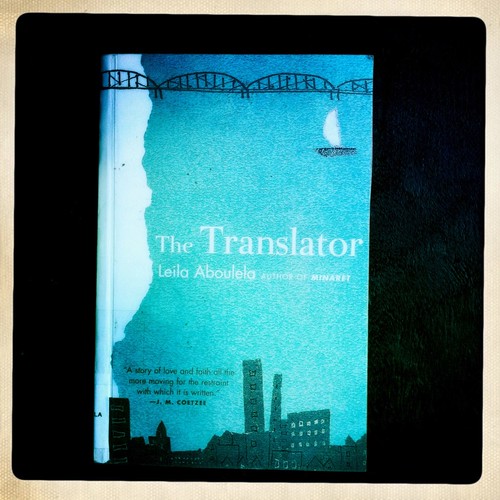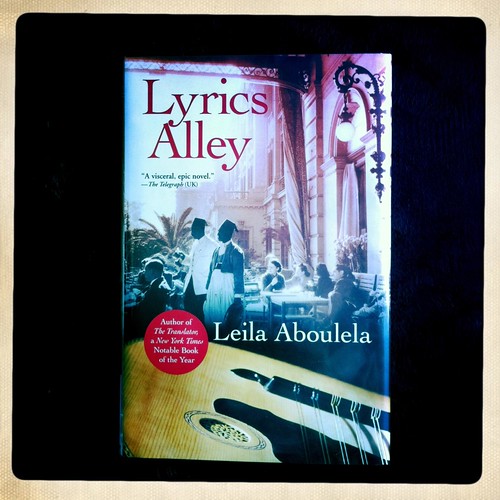I just finished two books by Leila Aboulela and I'd welcome the opportunity to read another. Both were entrancing reads that allowed a glimpse into a world so different from my own. I love adding books that offer that kind of perspective, mostly because it gives me an opportunity to learn and observe traditions, beliefs and lives carefully cultivated in a particular worldview. Both of these books are seeped in the country of Sudan and the religion of Islam. And they are so welcoming to the reader. They sort of invite you into the a world without over explaining what is going on but still acknowledging that the reader might not know all the details of the traditions. I felt brought into something new while also aware of my otherness.
The Translator, 1999
This is the story of a grieving widow who falls in love. The common human connection is one of empathy throughout the struggle to process loss. Additionally, the main character finds herself living in a kind of exile in Scotland, far from her home in Sudan. As a reader I could feel the contrasts of chilly Scotland and warm Sudan. Even though our cultures were vastly different I could also appreciate the commonness of pain no matter how it is experienced. The woman's tale is further complicated by her identity as a Muslim and her distance from the Anglo world around her. Additionally, she falls in love with a man who is not a Muslim and while she tries to appeal to him to simply speak the words necessary to convert he is unable to do so for fear of being inauthentic. I found myself drawn in by the author and wrapped in the narrative of the main character. Hoping that she will find love in the midst of a difficult relationship with her former mother in law and a strained attachment with her young son. The universal human similarities dominate while also expanding into a view of Islam that is wide and rich.
Lyrics Alley, 2010
This book has been on my mind since I finished reading it. I've been running the story lines through my head and pondering over the characters. While I liked the first book by this author, I found this second one difficult to put down. Its plot captured me right away. The story is told by several different voices, each chapter switches its perspective. While some people find this disconcerting I usually enjoy it. Though I will admit it can be difficult to leave one person's narrative and jump to another if something particularly dramatic has happened.
Why did I enjoy this book? Most of the main characters that narrate are young women and men who are caught up in their cultural and religious expectations. I suspect that I found it interesting to step into their perspectives that were different from mine and yet oddly not that different. Again the thing that struck me about the book was the universal human condition that can be translated across cultural boundaries. That's not to say there wasn't a tremendous amount that was unfamiliar to me, there was! And I had to go look up words that were new to me like "hoash" which is used to describe a traditional home area, from what I gathered is partly an outside courtyard type enclosure. The book also exposed my ignorance of African history, highlighting the relationship between Egypt and Sudan. I found myself intrigued enough to google more of the history to aid my understanding of the novel.
One reaction I have to the book is challenging for me to put into words. I found the narratives of the young people in the book especially captivating. One of them Soraya, is coming into her own throughout the book and as she grows she is also trying to find her place in a society that is extremely conservative towards the roles of women. She is both bound by the customs of her culture and pushing for more freedom. She is smart and successful and comes from a wealthy family. But she also suffers a tremendous tragedy. Her childhood love, the man she is betrothed too from a young age become paralyzed. The reader watches her move through denial, anger and acceptance of this change in her life plan. While I grieved with her as she let go of love and moved towards a marriage that would ensure her freedom and independence I also thought the author masterfully handled her transition. This reaction to the book is complicated for me because I think it would be easy for an American woman to read this book and get stuck on the oppressive nature of some of customs. And let me be clear I think female genital mutilation is oppressive and traumatic! But on the other hand I think that their needs to be balance in assessing a culture that is not your own. Striking that balance can be difficult and I'm conscious of the reality of my own identity in thinking about my reaction to books like this.



No comments:
Post a Comment